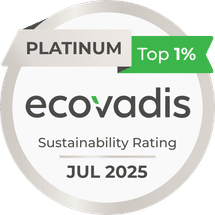AkzoNobel joins partnership to explore opportunities for green hydrogen and 'electrofuels' in Sweden
AkzoNobel Specialty Chemicals is partnering with three groups in Sweden to explore the opportunities for producing green hydrogen and 'electrofuels' using renewable electricity. The partners are RISE Research Institutes of Sweden (RISE), forestry group Södra and packaging materials company BillerudKorsnäs; the study is also supported by the Swedish Energy Agency.
Converting excess renewable electricity into green hydrogen or electrofuels (synthetic fuels based on electricity, water and CO2) offers the potential to balance the fluctuations in supply and demand of electricity from renewable sources including wind and solar power. AkzoNobel is a major user of electricity in Sweden, and will contribute its expertise in electrochemistry to the partnership.
"Sweden aims to have a 100% renewable electricity production in 2040, mainly to be achieved by expanding solar and wind-generated power production. More wind and solar energy brings a growing societal and industrial need to manage fluctations in electricity supply and demand. At the same time the large-scale availability of cost-competitive renewable power opens opportunities," says Anna-Karin Jannasch, Focus area manager Industrial Transformation at RISE.
"The interest in hydrogen for energy purposes as well as its application in the process industry has grown in the last few years. As a state owned research institute RISE aims to ensure the international competitiveness of Sweden's business community while contributing to a sustainable society, and this project is a good example of how we work as an innovation partner to industry."
Emma Ringström, Sustainability Manager Pulp and Performance Chemicals at AkzoNobel Specialty Chemicals, adds: "Renewable energy and biobased and recycled raw materials allows us to further reduce our environmental footprint and to meet customer needs for more sustainable products. But to really drive change in the industry and society it is key to collaborate with like-minded business in and outside the value chain."
The electrofuels concept is based on the process of electrolysis of water, which produces hydrogen and oxygen. This can be further combined with CO2 to produce for example methanol, which is a key feedstock for the manufacturing of chemicals and can also be further processed into synthetic fuels. In this way, the process serves as a carbon 'sink' by effectively recycling CO2 emissions.
Earlier this year AkzoNobel Specialty Chemicals and Dutch gas network operator Gasunie joined forces to investigate the possible large scale conversion of sustainable electricity into green hydrogen via the electrolysis of water. Building on the company's expertise in electrolysis and handling of hydrogen, the partners plan to use a 20 megawatt water electrolysis unit, the largest in Europe, targeting a production capacity of 3,000 tons of green hydrogen a year - enough to fuel 300 hydrogen buses.
Topics
Organizations
Other news from the department business & finance

Get the chemical industry in your inbox
By submitting this form you agree that LUMITOS AG will send you the newsletter(s) selected above by email. Your data will not be passed on to third parties. Your data will be stored and processed in accordance with our data protection regulations. LUMITOS may contact you by email for the purpose of advertising or market and opinion surveys. You can revoke your consent at any time without giving reasons to LUMITOS AG, Ernst-Augustin-Str. 2, 12489 Berlin, Germany or by e-mail at revoke@lumitos.com with effect for the future. In addition, each email contains a link to unsubscribe from the corresponding newsletter.


























































